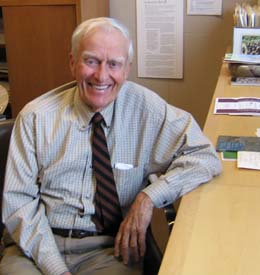Founded on May 23, 1910, the Municipal League of Seattle (now of King County) quickly became a leading organization in the area's Progressive Movement. In the first decades of the twentieth century, it initiated independent evaluations of political candidate qualifications (1912) and championed key governmental reforms, including establishment of a municipal civil service system and systematic land use controls. Following World War II, League visionaries such as Ben B. Ehrlichman (1895-1971) and James R. Ellis (b. 1921) led major regional campaigns to reform the King County Charter, to establish the Municipality of Metropolitan Seattle (Metro), and to fund infrastructure via Forward Thrust bonds and other public investments. It also conducted an important investigation of graft related to construction of the West Seattle Bridge in the 1970s and successfully advocated public disclosure of campaign finances. The League absorbed a quasi-independent Eastside chapter to become the Municipal League of King County in 1988.
Forum for Progressives
Urban "good government" reformers were inspired by Theodore Roosevelt (1858-1919), who established the National Municipal League in 1894 as a leading force in the new Progressive Movement. Progressivism appealed to members of America's new urban professional working class, who sought to replace corrupt, graft-ridden city governments with honest and "scientific" administrations. Many Progressive muckrakers and reformers decried the "shame of the cities" -- particularly the influx of immigrants and ward politics -- and tended to view traditional Republican and Democratic parties with equal distrust.
Forty-five Seattle citizens, including leaders such as Arthur Denny (1822-1899), Morgan Carkeek (1847-1931), and John McGilvra (1827-1903) established a local Municipal League on March 17, 1894, but the group disbanded a year later. The Municipal League was revived in 1909 by Hugh Caldwell, who would later become Seattle city attorney and mayor. A reorganized "Muni League" was established on May 23, 1910, by 120 charter members.
They went on to successfully champion the recall of Mayor Hiram Gill (1866-1919) and to create the Port of Seattle in the following year's election. The League was also an early advocate of public ownership of mass transit, electricity, and other key utilities. These issues helped to boost membership to more than 1,000 by 1913, despite its refusal to admit women.
Distrusted by Left and Right
In 1912, the League initiated its practice of non-partisan citizen evaluations of the qualifications of candidates for local office, which continues today (1990s). This program still draws periodic criticism from Republicans and, more commonly, from Democrats who question its political objectivity. Although the League made common cause with social reformers in its early years, local Leftists became distrustful during and after World War I, when the League tended to side with business interests against organized labor.
Despite ideological tensions, notable liberals such as future U.S. Senator Warren G. Magnuson and historian Murray Morgan served as the League's secretary (director) in the 1930s. At the same time, League members formed the "New Order of Cincinnatus" and ran slates for reform candidates for city office in the early 1930s, and launched the career of future Governor Arthur Langlie.
The League's membership dwindled to fewer than 350 during the Great Depression, which in 1937 prompted it to admit women members. In 1943, the League led a campaign to elect Seattle Freeholders to prepare a new city charter. The charter was adopted in 1946 and, notwithstanding numerous amendments in the decades since, still serves as the foundation of the Seattle city government.
The League also advocated a new King County home rule charter, but this was attacked as "communistic," and failed on November 5, 1952. The League's pursuit of reforms in County government earned it the enmity of both major political parties.
Regional Thrusts
Following the defeat of the new County charter, James Ellis and other League leaders began promoting creation of a "metropolitan government." This led to the creation of the "Municipality of Metropolitan Seattle" in 1958. The first "Metro" proposal, which included authority for water quality, regional parks, comprehensive planning, and mass transit, failed at the ballot on March 11, but a narrower plan focusing on sewage treatment passed on September 9, 1958. That same year, the Muni League honored James Ellis with its first annual "Civic Award."
By the mid-1960s, Metro succeeded in cleaning up Lake Washington and other regional waters. In 1966, Ellis proposed a new regional initiative, dubbed "Forward Thrust," to help control growth and fund essential public facilities. On February 13, 1968, voters approved seven of 12 bond issues, including the Kingdome, but rejected the plan's centerpiece mass transit plan. On November 5 of that year, voters approved a new King County charter supported by the League.
In 1970, voters rejected four recycled Forward Thrust bond packages, including mass transit. But they authorized Metro (which had strong League support) to begin operating transit services on September 19, 1972.
Scandals and Reforms
In 1975, League director William Massey coordinated an investigation that revealed serious graft and misconduct in the award of contracts for the new West Seattle Bridge. The League's findings led to indictments and convictions of the city engineer and several prominent state legislators. Also during the 1970s, the League supported school desegregation efforts and public disclosure of campaign finances, while opposing efforts to merge Metro and King County government (this was later mandated on constitutional grounds).
During the early 1980s, an independent Eastside Municipal League was formed (1981), but the original League's membership and influence waned. Beginning in 1986, a new "Public Agenda Project" of community outreach and publications revived interest. The League's work was carried out by the largest staff in its history, including executive director Steve Forman, research director Ray Hoffman, and policy director Walt Crowley. In 1988, the Boards of the Eastside and original Muni Leagues merged.
In the 1990s, the League has stayed true to its roots as an advocate of regional planning, growth management, public investment, and honest government -- and it remains either "too liberal" or "too conservative" for many political partisans.

